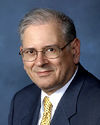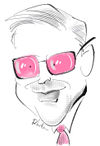Robert Kahn: Difference between revisions
No edit summary |
|||
| Line 17: | Line 17: | ||
Dr. Kahn first met Dr. Cerf at U.C.L.A. in 1969, after the ARPANET nodes had been nationally distributed. At that time, he was working at an engineering firm in Cambridge, Mass., and travelled to U.C.L.A. to experiment with the new network. | Dr. Kahn first met Dr. Cerf at U.C.L.A. in 1969, after the ARPANET nodes had been nationally distributed. At that time, he was working at an engineering firm in Cambridge, Mass., and travelled to U.C.L.A. to experiment with the new network. | ||
By the time they published their famous paper, in 1973, Vinton was a professor at Stanford and Robert was working within the Defense Department's [[Advanced Research Projects Agency]], the founders of the [[ARPAnet]]. They did not claim their protocols as [[Intellectual Property|intellectual property]], and thus | By the time they published their famous paper, in 1973, Vinton was a professor at Stanford and Robert was working within the Defense Department's [[Advanced Research Projects Agency]], the founders of the [[ARPAnet]]. They did not claim their protocols as [[Intellectual Property|intellectual property]], and thus it was able to flourish as an open standard.<ref>[http://www.nytimes.com/2005/02/16/technology/16internet.html?pagewanted=2 NYTimes.com]</ref> | ||
==Memberships== | ==Memberships== | ||
* Fellow, [[ACM]]<ref>[http://fellows.acm.org/fellow_citation.cfm?id=4598637&srt=alpha&alpha=K ACM.org]</ref> | * Fellow, [[ACM]]<ref>[http://fellows.acm.org/fellow_citation.cfm?id=4598637&srt=alpha&alpha=K ACM.org]</ref> | ||
Revision as of 23:41, 25 May 2011
 |
 |
| Country: | USA |
Robert E. Kahn is the co-inventor of the TCP/IP system that established the architectural basis of the Internet. He worked with Vinton Cerf to write the famous paper, "A Protocol for Packet Network Interconnection".[1]
Dr. Kahn is the Founder, Chairman, CEO, and President of the Corporation for National Research Initiatives.[2]
The Beginning[edit | edit source]
Dr. Kahn first met Dr. Cerf at U.C.L.A. in 1969, after the ARPANET nodes had been nationally distributed. At that time, he was working at an engineering firm in Cambridge, Mass., and travelled to U.C.L.A. to experiment with the new network.
By the time they published their famous paper, in 1973, Vinton was a professor at Stanford and Robert was working within the Defense Department's Advanced Research Projects Agency, the founders of the ARPAnet. They did not claim their protocols as intellectual property, and thus it was able to flourish as an open standard.[3]
Memberships[edit | edit source]
- Fellow, ACM[4]
- Member, Board of Directors, Qualcomm[5]
- Member, National Academy of Engineering
- Fellow, Institute of Electrical and Electronics Engineers
- Fellow, Association for the Advancement of Artificial Intelligence
- Fellow, Computer History Museum
- Member, U.S. State Dept.'s Advisory Committee on International Communication and Information Policy
- Former Member, President's Information Technology Advisory Committee
- Former Member, Board of Regents of the National Library of Medicine
- Former Member, President's Advisory Council on the National Information Infrastructure[6]
Career History[edit | edit source]
- Technical Engineer, Bell Laboratories
- Assistant Professor of Electrical Engineering, MIT
- Engineer, Bolt Beranek and Newman
- Director of Information Processing Techniques, DARPA
- Founder, Chairman, CEO and President, CNRI[7]
Awards and Recognition[edit | edit source]
Robert, along with Vinton Cerf, recieved the 2004 ACM Turing Award. When they received the prize it was the first time in the 39 year history of the award that it was conferred in honor of work done on computer networking.
In 1997, Robert received the National Medal of Technology. That year he and Vinton also received the IEEE Alexander Graham Bell Medal.[8] He shared the 2001 Charles Stark Draper Prize with other important pioneers of the early Internet networking system.[9]
Prof. Kahn is a two-time recipient Secretary of Defense Civilian Service Award; and has received the Presidential Medal of Freedom
Other awards include:
- AFIPS Harry Goode Memorial Award
- The Marconi Award
- ACM SIGCOMM Award
- ACM President's Award
- IEEE Koji Kobayashi Computer and Communications Award
- IEEE Third Millennium Medal
- ACM Software Systems Award
- Computerworld/Smithsonian Award
- Computing Research Board ASIS Special Award
- Computing Research Board Public Service Award
- 2002 Prince of Asturias Award
- 2003 Digital ID World award for the Digital Object Architecture
- 2005, Townsend Harris Medal from the Alumni Association of the City College of New York
- C & C Prize in Tokyo, Japan
- 2006 Inductee, National Inventors Hall of Fame
- 2008 Japan Prize for his work in ICT Theory
- 2010 Harold Pender Award from the University of Pennsylvania
Honorary Degrees[edit | edit source]
He has received honorary degrees from the following institutions:
- Princeton University
- University of Pavia
- ETH Zurich
- University of Maryland
- George Mason University
- The University of Central Florida
- University of Pisa, and an
- Honorary Fellow, University College[10]
Education[edit | edit source]
- B.E.E, City College of NYC, 1960
- M.A., Princeton University, 1962
- Pd.D., Princeton University, 1964
